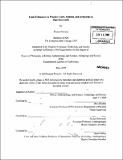From enthusiasm to practice : users, systems, and technology in high-end audio
Author(s)
Downes, Kieran
DownloadFull printable version (86.94Mb)
Alternative title
Users, systems, and technology in high-end audio
Other Contributors
Massachusetts Institute of Technology. Program in Science, Technology and Society.
Advisor
David Kaiser.
Terms of use
Metadata
Show full item recordAbstract
This is a story about technology, users, and music. It is about an approach to the design, manipulation, and arrangement of technologies in small-scale systems to achieve particular aesthetic goals - goals that are at once subjective and contingent. These goals emerge from enthusiasm for technology, for system-building, and for music among members of a community of users, and the promise of the emotional rewards derived from these elements in combination. It is a story about how enthusiasm and passion become practice, and how particular technologies, system-building activities, listening, debating, innovating, and interacting form that practice. Using both historical and ethnographic research methods, including fieldwork and oral history interviews, this dissertation is focused on how and why user communities mobilize around particular technologies and socio-technical systems. In particular, it concerns how users' aesthetic sensibilities and enthusiasm for technology can shape both technologies themselves and the processes of technological innovation. These issues are explored through a study of the small but enthusiastic high-end audio community in the United States. These users express needs, desires, and aesthetic motivations towards technology that set them apart from mainstream consumers, but also reveal important and under-recognized aspects of human relationships with technology more broadly. Covering the emergence and growth of high-end audio from the early 1970s to 2000, I trace some of the major technology transitions during this period and their associated social elements, including the shift from vacuum tube to solid-state electronics in the 1970s, and from analog vinyl records to digital compact discs in the 1980s. I show how this community came to understand technology, science, and their own social behavior through powerful emotional and aesthetic responses to music and the technologies used to reproduce music in the home. I further show how focusing on technology's users can recast assumptions about the ingredients and conditions necessary to foster technological innovation.
Description
Thesis (Ph. D. in History, Anthropology, and Science, Technology and Society (HASTS))--Massachusetts Institute of Technology, Program in Science, Technology and Society, 2009. Page 414 blank. Includes bibliographical references (p. 401-413).
Date issued
2009Department
Massachusetts Institute of Technology. Program in Science, Technology and SocietyPublisher
Massachusetts Institute of Technology
Keywords
Program in Science, Technology and Society.